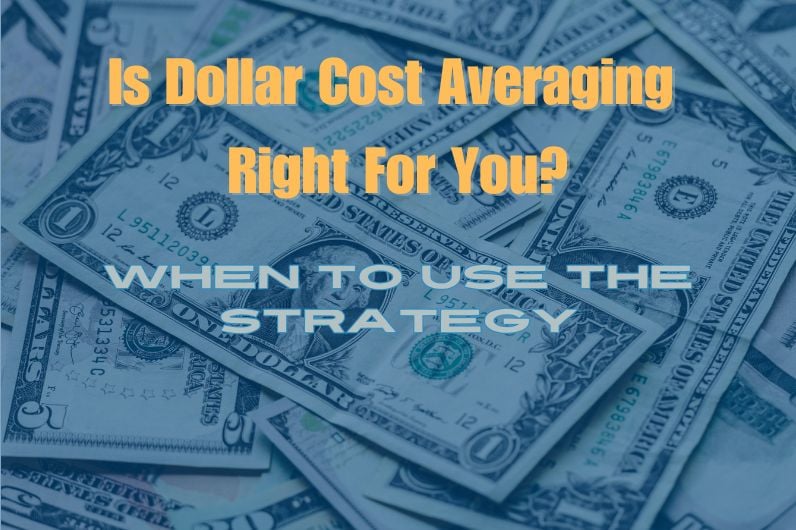Investing can be a powerful tool to help you grow your wealth over time.
Investing is smart whether you’re saving for retirement, a home, or simply looking to make your money work harder for you.
But where do you begin on this financial journey?
Understanding where to begin and investment basics is important because it helps you make investments that suit your comfort level and financial goals.
Best Real Estate Platform

Fundrise
Welcome to the future of real estate investing. Invest now and get $10 in shares. It only takes a few minutes to get started!
Start Investing Now
Key Takeaways
- Start Investing Early: Begin investing as soon as possible to maximize the benefits from compound interest, which can significantly grow your money over time.
- Set Clear Goals: Establish clear financial goals and a strategic investment plan.
- Pick a Risk Tolerance: Assessing your risk tolerance helps you make well-informed decisions on how much money you’re willing to put into investment options.
- Understand Investment Types: Understanding different investment types like stocks and mutual funds.
- Diversify Your Portfolio: Mitigate risks by diversifying your portfolio with different assets such as stocks, bonds, real estate, and mutual funds.
How To Become An Investor


Learn About Investment Types
When it comes to investing, knowing your options is key.
Each investment type has its characteristics– risk levels, potential rewards, liquidity, and how they fit into your strategy.
Understanding these aspects is key to building a portfolio that aligns with your goals and comfort level.
A few main types of investments to get familiar with are:
Individual Stocks – Picture owning a tiny piece of a big company. If the company thrives, the value of your piece goes up.
But it’s not always smooth sailing – if the company struggles, so does your investment.
Bonds: When you buy a bond, you’re lending money to a company or the government. In return, they agree to pay you back with interest over time.
It’s generally a less dramatic investment than stocks, often offering more stability and less heart-pounding ups and downs.
Mutual funds – These funds pool your money with other investors to buy a mix of bonds, stocks, or other assets.
Managed by professionals, mutual funds are a way to diversify your investments without making every decision yourself.
Real estate – Property investment can range from buying a home to investing in commercial real estate.
It often requires more upfront capital but can add a valuable dimension to your investment portfolio.
Figure Out Your Risk Tolerance
Understanding your risk tolerance is about knowing how much risk you can handle in your investment goals.
Why is this so important? Because knowing your risk tolerance helps set the stage for how your investment portfolio is put together.
Your risk tolerance influences everything from the types of investments you choose to how you balance your portfolio’s risky and safe parts.
Think of investing like a seesaw– on one end, there’s the chance of higher returns, and on the other, the potential for bigger losses.
Your personal investment goals, how long you plan to invest, and how you feel about the market’s ups and downs all shape your risk tolerance.
Some handy tools, like risk tolerance questionnaires, can give you a clearer idea of where you stand.
These quizzes ask about your financial situation, goals, and feelings about risk, helping to paint a picture of your ideal investment strategy.
Decide How Much Money You’ll Invest
Determining how much to invest is crucial. Your initial investment amount should match what you’ve got in the bank and how comfortable you are with taking risks.
Instead of dropping a large sum at once, consider spreading your investments out over time and growing your portfolio bit by bit with different assets.
This strategy, called dollar-cost averaging, can help smooth out the bumps of market ups and downs. That way, you don’t have all your money and are ready to lose at any moment.
Pick An Investment Strategy


Choosing the right investment strategies is a big deal when you’re ready to start investing.
Your strategy should align with your savings goals, how much you can invest, and how long you plan to invest.
As an investor, you’ve got a few paths to choose from:
- Active management: This is like having a guide who makes hands-on, informed decisions to try and get ahead of the market.
- Passive management (Robo advisors): This is your go-to if you’re more about taking it easy and being hand-off with minimal fuss.
- Growth investing: Here, you’re looking for investments with the potential for big growth, even if there’s more risk.
- Value investing: It’s all about finding undervalued gems you believe will pay off in the long run.
- Short-term investing: Think of quick turnarounds and maximize market movements in a shorter timeframe.
- Long-term investing: This is for those playing the long game, focusing on steady growth over many years.
Each of these strategies has its advantages. For example, passive management often involves investment advice from professionals to make quick, speculative investment decisions.
Join The Right Investment Platform
Getting started in investing means finding a platform that fits your investment goals. You have a couple of main options: traditional brokerage accounts and robo-advisors.
Brokerage accounts offer a hands-on approach. They allow you to trade securities and often come with tools and resources.
My top example would be Robinhood, a popular hands-on investing platform for new investors who want to get into stocks and ETFs.
Robo-advisors, on the other hand, offer a more automated experience. They use algorithms to manage your investments, focusing on simplicity and cost-effectiveness.
In my opinion, the best Robo advisor is Betterment, a low-cost platform with automated investing tools to make your money work.
Best Investments
With numerous investment options, selecting the most suitable ones can be complex.
The key lies in diversification- spreading your investments across different assets to mitigate risks.
For new investors, adding a mix of stocks, bonds, and alternative investments can help build a diversified portfolio.
Here are my top picks for the best investments:
Real Estate


Real estate investing is a solid choice for those who want to expand their investment portfolios and increase their wealth.
Different platforms offer investment opportunities for both newcomers and experienced real estate investors.
Here’s how you can make money from real estate:
- Real Estate Investment Trusts (REITs): For a more hands-off approach, REITs allow you to invest in real estate without owning physical properties.
- Real Estate Investment Groups (REIGs): These groups are similar to mutual funds for property investors. It is ideal for those who want a piece of the rental market without the day-to-day management tasks.
- House Flipping: Perfect for the more adventurous investor, this involves purchasing properties, sprucing them up, and selling them at a profit. It’s a hands-on approach and can be quite rewarding.
- Buying, Selling, and Financing Properties: This is the classic real estate play for investors with more funds. The idea is to buy low, sell high, or earn through financing deals.
- Rental Properties: For those with money to invest upfront, becoming a landlord can provide a steady flow of income- your investment pays off month after month.
Companies like Fundrise own and manage a range of real estate, giving you a diversified investment option.
It’s my top pick to invest in real estate- read more about it in my detailed Fundrise Review.
Best Real Estate Platform


Fundrise
Welcome to the future of real estate investing. Invest now and get $10 in shares. It only takes a few minutes to get started!
Start Investing Now
Stock Market & ETFs
Investing in the stock market and exploring Exchange-Traded Funds (ETFs) can help you achieve financial independence.
ETFs are like curated playlists of securities – when you buy a share, you get a piece of the action, a mix of different stocks or bonds, all traded on the big stock exchanges.
However, investing in stocks and ETFs isn’t a guaranteed money booster; it comes with risks.
So, before you start, it’s like learning the rules of a new game – understand what individual stocks are, how they work, and what influences their value.
Pick a brokerage account that suits you; it’s like choosing your tool for the job. There are various online brokers like Robinhood and Acorns, each offering unique features.
Check out how they compare in my Acorns Vs. Robinhood article and see which might be better to get into investing.
Grab Your FREE Stock


Retirement


Focusing on retirement is a smart move in your financial journey and a key part of planning for your future.
Putting money into these investing accounts isn’t only about saving for the golden years. A retirement account boosts your investment portfolio.
It’s a savvy move to snatch some tax benefits with a retirement account, something successful investors know all too well.
Retirement accounts, like IRAs and 401(k)s, are more than just places to park your cash. They’re packed with tax advantages, making them great tools for long-term investment strategies.
And, platforms like Betterment can be super helpful to get started investing in these accounts. The earlier you dive in, the smoother your retirement could be.


Betterment
Investing made better! Meet the app that gives you the tools, inspiration, and support you need to become a better investor.
Invest Better Today
Bonds
Bonds are a solid pick if you’re looking for an investment with less risk than stocks.
When you buy a bond, you lend your cash to companies, financial institutions, or the government. They promise to pay you back on a certain date, plus some interest.
Different bonds to pick from include government, corporate, municipal, and international market bonds.
Although bonds are often considered safer than stocks and have a predictable payback schedule, they usually offer lower returns over time.
Online brokers like M1 Finance can be a good move, especially to align with your investing goals and minimize the risk of losing money.
You can sign up and get pre-made portfolios that fit your risk tolerance with various stocks and bonds that put your money to work.
Read more about it in my in-depth M1 Finance Review.
Mutual Funds


Mutual funds are a fantastic choice for spreading out your investments, all thanks to the savvy skills of professional fund managers.
Here’s what you get when you go the mutual fund route:
- A mix of investments (a.k.a. diversification)
- Expert portfolio management
- Automatic reinvestment of dividends
- A lower risk level
- Convenience
- Fair pricing on your shares
There’s a buffet of mutual fund types out there. You’ve got actively managed ones where pros are trying to beat the market.
But remember, when doing your financial planning, investing in mutual funds still carries some risk- just like any investment!
Start by opening a brokerage account with a reputable company, like TD Ameritrade or Fidelity.
FAQs
What requirements are there to become an investor?
Becoming an investor doesn’t require a formal set of qualifications or certifications like some professions do, but there are some important steps you need to remember:
- Financial Stability: Have control over debts and a steady income.
- Basic Financial Knowledge: Understand the fundamentals of investing and markets.
- Risk Tolerance: Know how much market fluctuation you can comfortably handle.
- Investment Goals: Set clear objectives for what you want to achieve with your investments.
- Investment Platform: Choose a platform, like a brokerage account or robo-advisor, to make your investments.
- Initial Capital: Have some money to start investing, even a small amount.
Can I become an investor with only a little money?
You can become an investor even with a small amount of money. Here are a few points to consider:
- Fractional Shares: Many investment platforms now offer fractional shares that allow you to buy a portion of a stock or share of art on a platform like Robinhood.
- Low-Cost Investment Options: Look for low-cost investment options, like index funds or exchange-traded funds (ETFs), with lower minimum investment requirements.
- Automatic High-Yield Savings Accounts: Get automatic savings, where Chime pays you interest to build up your funds.
- Dollar-Cost Averaging: Invest a fixed amount regularly in a variety of options. It can be a good way to start investing with a smaller budget.
How do investors get paid from investments?
Investors can earn money from their investments in several ways:
Capital Gains: This is when you sell an investment (like stocks or property) for more than you paid. The profit you make is known as a capital gain.
Dividends: Many stocks pay dividends, and portions of a company’s profits are distributed to shareholders. If you own dividend-paying stocks, you’ll receive payments, typically quarterly.
Interest Payments: If you invest in bonds or other fixed-income securities, you’ll earn money through interest payments, which are periodic payments based on the bond’s interest rate.
Rental Income: If you invest in real estate and rent out properties, you’ll receive rental income from tenants. REITS on Fundrise also bring in rental income without you being a landlord!
Reinvestment: Earnings from investments, like dividends or interest, can be reinvested to buy more shares, potentially increasing investment returns over time.
Final Thoughts


Learning how to invest can change how you make money, creating passive income without having to work.
Becoming a successful investor is about learning the ropes, making thoughtful choices, and staying focused on long-term goals without being rattled by market fluctuations.
Spread your investments across real estate, the stock market, retirement accounts, bonds, and mutual funds.
That way, you’re not putting all your eggs in one basket and can ride out the ups and downs like a pro.
With a well-defined investment strategy and the right platform, you’re on your way to making those financial dreams a reality.
So join Fundrise or Robinhood and start putting your funds toward more money!
Best Real Estate Platform


Fundrise
Welcome to the future of real estate investing. Invest now and get $10 in shares. It only takes a few minutes to get started!
Start Investing Now





















Discussion about this post